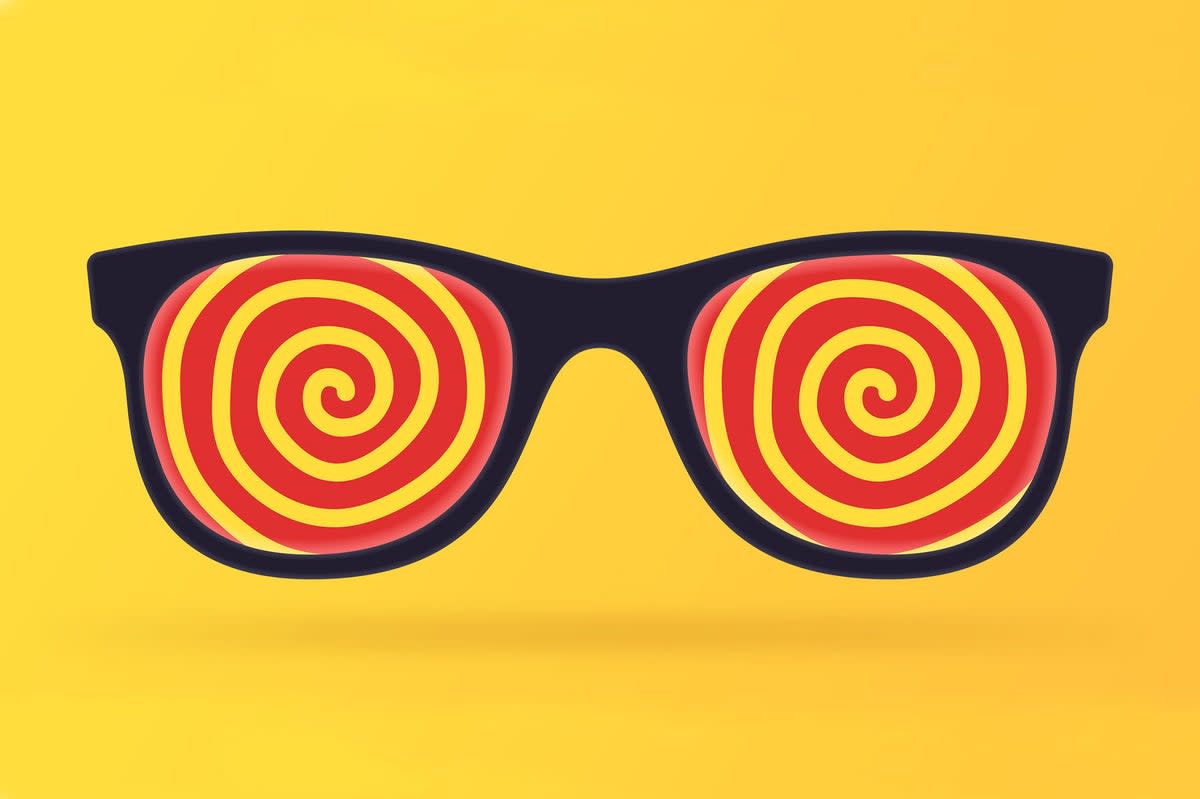I tried hypnosis to help me de-stress my life – here’s what happened

I was always a little hesitant about hypnosis, ever since my stepsister went out with a professional hypnotist. He was hardly Paul McKenna in terms of fame, but I had once seen him take to the stage in a church hall and make a group of people fall in love with him using just his mind. Truth be told, I’ve always found hypnosis a little creepy, and the thought of somebody else taking control of my senses leaves me terrified.
That said, 20 years ago I underwent hypnosis to curb my craving for cigarettes, and it worked – it stopped me smoking 40 a day. Could it also banish my stress and negative thoughts? They typically come to me in the morning, usually around 6am. There’s no particular thread to them. I just have the general feeling that I’m not good enough, and that everything is going to go wrong. I waste so many hours catastrophising. Once I’m up and out of bed it generally dissipates, but still there is that gentle whisper of negativity niggling away at my happiness.
As much as I tell myself to keep things together in the daytime, I struggle to stop myself spiralling into “stinking thinking”, as it’s dubbed in therapy. But perhaps hypnosis is the answer I’ve been looking for. David Beckham, Reese Witherspoon and Mel B are among the stars who’ve reportedly banished negative thinking this way. Could it really be as simple as “look into my eyes…”? Abracadabra and my mind is fixed?
Hypnosis occurs when someone enters a state of relaxed awareness, in which the subconscious is open and receptive to suggestion. The aim is to rewire a person’s mind, providing them with new ways of thinking and feeling. It is an unregulated industry – anybody can set themselves up as a hypnotherapist – but there is growing evidence that suggests hypnosis is effective for many people experiencing problems including pain, anxiety, PTSD, and phobias.
“It is the oldest western form of psychotherapy,” says the US-based Dr David Spiegel, a Stanford University psychiatrist and leading researcher of hypnosis, who has co-founded Reveri, an interactive hypnosis app that helps people manage stress, pain, insomnia, fears, and to stop smoking. “But it’s still tainted by fears about mind control, or [ideas] of stage hypnotists making people do silly things. It’s sometimes considered unscientific because it is not ‘biological science’ – eg: is not a drug. That can be a good thing. I am a physician – I prescribe drugs. But not all the time.” Despite hypnotherapy’s record of success, he says that it is “used rarely and by a small number of healthcare professionals – it’s been derided as a stage show trick, considered useless or even dangerous, none of which is true. Hypnosis is an underappreciated means of controlling consciousness with enormous therapeutic potential.”
The UK hypnotist Aaron Surtees, who runs City Hypnosis and has been featured on Channel 4’s Embarrassing Bodies and How to Lose Weight Well, says that “practically any mental issue can be helped through hypnotherapy,” as long as a person is “open and wants to change”. Surtees also has a hypnosis app called Subconsciously and his clients include Ant McPartlin and Charlie Brooker. “A lot of my clients are Hollywood stars – with anxiety and addictions to smoking,” he says. He also helps bankers to regulate their stress and anxiety, and treats footballers and top athletes to “enhance performance, focus and confidence”.
Hypnosis is increasingly popular in our fast-paced society – it’s the lure of the quick fix
Zoe Clews, hypnotist
Hypnotism sounds like a magic wand to me. Could the dark skies of my mind turn technicolour after just one session? I set off to see hypnotist Zoe Clews in London’s Marylebone. She has a long list of celebrity clients and specialises in anxiety, depression and complex PTSD (an initial two-hour session is £295, while 90-minute follow-up sessions are £245). A team of 12 work with her, who specialise in other issues including fear of public speaking. She tells me that being hypnotised is “increasingly popular in our fast-paced society – it’s the lure of the quick fix”. She claims hypnotherapy has much faster results than traditional therapy “as it works to override the subconscious – which is the true powerhouse when it comes to change”.
Clews is bright and breezy company, dressed in a peachy pink satin trouser suit. Her voice is incredibly relaxing – it’s almost as if she is the living incarnation of a clinking ice cube melting into a cool drink. That also happens to be one of the images she uses to help me. I’m told to imagine my stress dissolving much like that ice cube, as Chews guides me into a “trance state”.
When Clews started in the profession 22 years ago, she says her choice of career was looked upon as “bizarre” – but not anymore. Psychotherapists will send to her clients with complex trauma when they’ve got phobias they are unable to shift. “Hypnosis is really targeted on the issue, and forensic in shifting something specific,” she says. While there are some things hypnosis can shift easily, she says, like smoking and phobias, others take longer because “there is more damage”. These include complex PTSD, for example. “It might be between five and 20 sessions.” But she’s confident a single two-hour session will do the trick for me.

Only 30 per cent of her clients “go out like a light”, Clews tells me. The idea panics me. But it doesn’t impact the benefits if you remain alert – as I do. Like many people trying out hypnotism, I have fears about ending up on all fours barking like a dog, talking to fairies or dancing with a broom thinking it’s a really attractive man. But it’s nothing like this, she assures me.
“When a stage hypnotist is working with somebody for entertainment, they’ll have done suggestibility tests to check that somebody is good for hypnosis,” she says. “It might be subtle so you don’t see it, because what a stage hypnotist will want is someone who is going to go into hypnosis as quickly as possible.” Hypnotherapy is about “healing damage” and “setting people free” from all sorts of conditions, she continues. In my case, I have to let go of negative thought patterns, fears, subconscious blocks, limiting beliefs, and unhelpful behavioural patterns.
She sets to work clearing layers of my negative thinking, first by talking about my childhood. Then she works with my subconscious to let those feelings go, so I’m ready for a more abundant life. “Health, wealth, happiness, joy,” she says. Most interestingly, she is going to do some “cord cutting” of toxic people in my life – “to lessen the impact on the nervous system”. As she explains, “if a friend behaves badly, you say ‘bye’, but when it’s family or work colleagues you often have to deal with it.”
She warns me I might feel “icky” when I’m “cord cutting” – but “it’s only temporary and I will feel a lot freer afterwards”. Not only this, but she wants to help me let go of historical stress and find a “window of tolerance”, she says, to reconnect me to “a state of calm” and ask the subconscious to keep me “grounded and connected to a sense of safety and stability within”.

I’m told my nervous system is “in shatters” and “I’m stuck in flight or fight response”. “My job is to take you out of it,” she says. “Turn the volume down on acute stress.” As she counts me down from 10 to zero, I keep panicking about losing control – I had no idea I was such a control freak. By the time I’m told to imagine the letters of the alphabet dropping in front of me, my mind is distracted enough to move into a highly relaxed state.
It’s almost as if I’m in a room filled with rose coloured air. I feel “as light as a feather” … “as light as a feather” …. ”as light as a feather”. I can hear Clews licking her lips as I go deeper into a calm space. Never once do I feel like I have lost my awareness – even as I visualise cutting cords with half my family and seeing them skuttle off like tiny mice while I stand in my light.
That night, I enter a deep sleep. And when I wake up, I feel more joyous. I still get niggles of fear and negativity, but I throw them off more easily. I have an MP3 of the session to listen to at home – to help my subconscious accept my new reality. I don’t know if it’s connected to being hypnotised, but by day three I’m having the most mind-blowing coincidences that I think could impact the course of my destiny.
Luck feels on my side; people offer to do incredibly nice things for me and difficult people in my life are reacting better. Has my subconscious activated a new reality? Am I seeing it play out in front of me? I’m certainly going to believe in it. After all, there is nothing stronger than the power of the mind.


